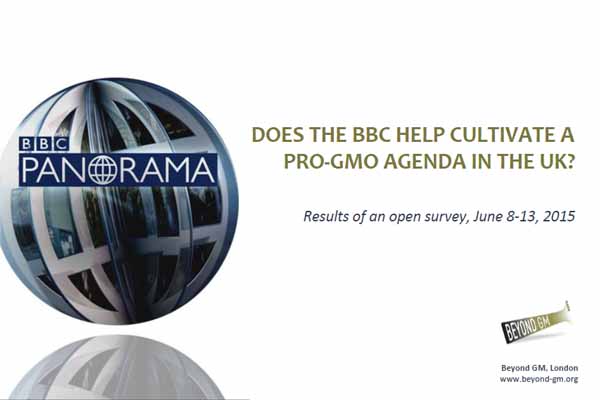BBC Panorama: Cultivating Lies and Ignorance Around GMOs

I’ve seen a lot of really crappy TV programmes about GMOs over the years.
I’ve read so-called ‘news’ stories that were blatantly re-written press releases, and so essentially advertisements for the biotech industry. My expectations of the media in this regard, are now so low I can’t usually be surprised. But watching the BBC Panorama programme GM Food- Cultivating Fear something snapped in me and many others I know.
My Beyond GM colleague Lawrence Woodward and I wrote a comprehensive critique of this shameful programme, which purported to be ‘balanced’ but which relied on a parade of pro-GM advocates – some of whom are GM patent holders and therefore vested interests – to provide its narrative. It was a cynical, misleading, cherry-picked GMO love-fest that fell far below the BBC standards (though these have been slipping of late) and painted those who have legitimate questions and concerns about GMOs (a group that includes the majority of BBC viewers) as hysterics, fear-mongers and Luddites.
On the heels of the programme Beyond GM also undertook an open survey of 1000 people to ascertain how adequately and respectfully public concerns about genetic modification in food and farming are represented by the BBC. This substantial document Does the BBC Help cultivate a Pro-GMO Agenda in the UK?, of which I am the lead author, is now available online.
It shows that nearly 70% of respondents (drawn from both sides of the GMO fence) do not trust the independence of experts featured on BBC programmes. Nearly 90% of the people surveyed felt that academics, researchers and other independent experts featured on BBC programmes should reveal their sources of income, corporate affiliations and whether or not they are patent holders to the public before being interviewed on BBC programmes. Nearly three quarters of the respondents felt the BBC programming represented a pro-GM stance.
The report – a significant addition to the literature on public views on GMOs – features context and background to our media’s preoccupation with a pro-GMO agenda, and makes a plea for a broader debate that includes and respects the widespread public concern over GMOs in our food system.












